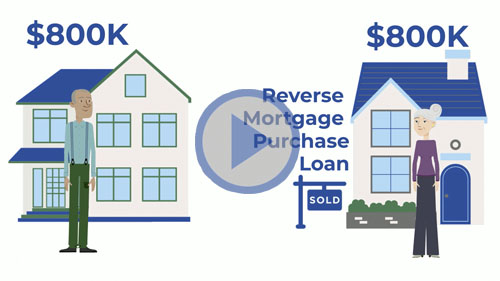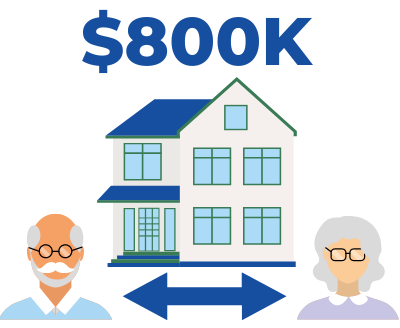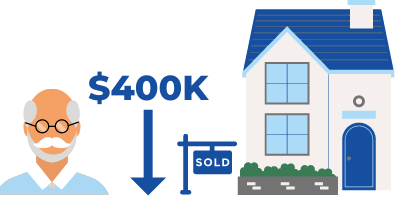Attorneys
Reverse Mortgage Strategies for Attorneys and Their Clients
The vast majority of reverse mortgages are federally insured through the Federal Housing Administration’s (FHA) Home Equity Conversion Mortgage (HECM) program, which is a non-recourse mortgage loan for homeowners aged 62 and older. The loan can convert a portion of a client’s home equity into cash or pay off an existing mortgage. Monthly payments are not required but are optional.
Reverse Mortgage Basics
The homeowner never gives up ownership or control of the home, any existing mortgage balance is paid, and any remaining loan proceeds are tax-free.* As long as the borrower lives in the home, no monthly mortgage payments are required. The homeowner must pay property taxes, insurance, and applicable association dues. They must also perform regular maintenance of the home and keep it in good condition. If the mortgage balance ever exceeds the value of the home in the future, FHA mortgage insurance protects the homeowner and their heirs.
The property, not the borrower, is eventually responsible for paying off the reverse mortgage loan. The borrower signs a release of personal liability at closing. The heirs of the estate will have six months to decide how they want to proceed with the property. They will have the option to request up to two 90-day extensions for additional time as long as they show progress is being made. Assuming the house goes to the heirs, they have four options:
1.
Purchase the home for 95% of the appraised value if the value is less than the outstanding balance.
2.
Refinance or pay off the outstanding balance of the reverse mortgage.
3.
Sell the house and keep the leftover proceeds after paying off the reverse mortgage.
4.
Choose to not purchase the home and walk away with no obligation.
(FHA mortgage insurance will pay any shortfall as long as they continue to meet the loan guidelines)
Reverse Mortgage Legal Specific Issues
Up to two deeds or mortgages are filed for 150% of the appraised value of the house, providing protection from creditor liens.
Title Deed never changes hands until the borrower moves out or passes away.
Properties can be held in revocable or irrevocable trusts.
Attorney Practice Areas That Can Use Reverse Mortgages:
Potential Benefits to Your Clients
Permanent Cash Flow
Tenure payments last until death. Credit lines are guaranteed to increase and cannot be closed.
Increased Retirement Portfolio Longevity1
Decreased Income Taxes2
Potentially Increase Net Worth and Legacy for Heirs3
Fund Important Legal Work
Planning for Long-term Care (LTC) and Medicaid Issues
- Pay for LTC insurance premiums
- Pay attorney fees for proper LTC planning
- Credit Lines are not accountable assets that affect program eligibility
- Pay attorney fees for proper LTC planning
- Credit Lines are not accountable assets that affect eligibility
- Private Pay LTC during the five-year look back period
- Convert countable assets to exempt equity
Estate Planning*
- Home equity must be part of the planning process: There are trillions of dollars in home equity locked in the homes of people over the age of 62
- Can be used to fund attorney fees for wills, trusts and advanced directives
- Lower lifetime taxable estate by reducing equity value
- Pay for life insurance policies needed for planning or that are running out
- Fund probate or estate taxes
- Lower home equity below the taxable limit
Tax Planning*
- Replace taxable income with reverse mortgage loan proceeds
- Let interest build up so deductions can be stacked together, unlike a traditional mortgage which requires you to make payments even if there is not enough to deduct
- Pay interest the same year as IRA withdrawals to offset taxable income
- Posthumous estate tax planning: Pass on a potential tax deduction to heirs to offset inherited taxable IRAs.
Find Out How Your Clients May Benefit
Please fill out this form and we will get back to you ASAP.
*This advertisement does not constitute tax advice. Please consult a tax advisor regarding your specific situation. The homeowner is still responsible for paying property taxes, homeowner’s insurance, applicable association dues, and for maintaining the property.







